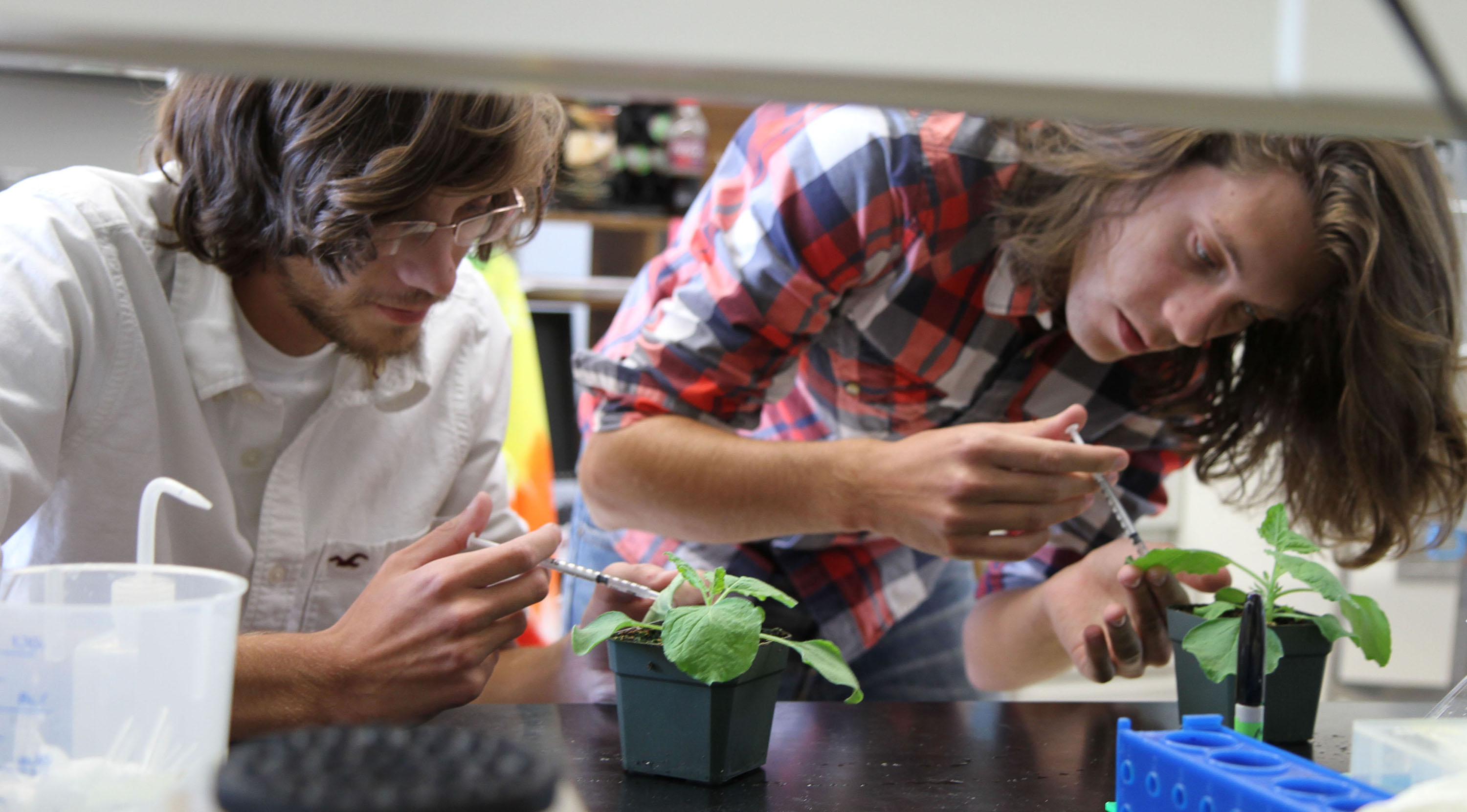For twin plant pathologists, it all comes down to genetics

Billions of dollars of crop loss in the United States and worldwide can be attributed to oomycete pathogens, a distinct lineage of fungus-like eukaryotic microorganisms that infect many plant species.
Twin brothers Kevin and Mike Fedkenheuer of Norwood, N.J., both Ph.D. students in the plant pathology, physiology, and weed science department in the College of Agriculture and Life Sciences, examine the molecular genetics of oomycete pathogens in order to understand how they alter the immunological responses of different plant and beans species. The oomycete pathogen Phytophthora strains are infamous for the Irish famine, which nearly halved Ireland’s population in the 1800’s.
Working with John McDowell, associate professor of molecular plant pathology in the College of Agriculture and Life Sciences and an affiliated faculty member with the Fralin Life Science Institute, the Fedkenheuers are trying to identify the genetic differences between bean plants that recognize the pathogens and those that do not.
“The benefit is that these seeds are not considered genetically modified,” said Mike Fedkenheuer. “The genes are already there, we just need to find them and breed them in; we are essentially just rushing evolution,” said Kevin Fedkenheuer.
Both Fedkenheuers are progressing toward engineering a transgenic seed with the ability to defend itself. Kevin Fedkenheuer works with soybean cultivars and Mike with other beans and legumes. To accomplish this task they conduct effector directed breeding.
Effector directed breeding involves growing hundreds of plants in a Latham Hall laboratory, infecting them with the pathogen, identifying which plants survive and then determining what resistance genes make it able to identify and then fight off the pathogen. Once those novel resistance genes are found they will speed the process of evolution by breeding these genes into seeds used by the majority of farmers today.
“Kevin is a very bright and creative student. In only a few months, he set up a system for screening for new pathogen resistance genes in soybean,” McDowell said. “I recently learned that a large group in China had been trying to set up a similar system for two years without success. Now we are going to collaborate with this group and they are going to use Kevin’s system. Kevin is also bringing new technologies into my lab as part of his second project on transcript profiling.”
Transcript profiling involves looking at how all the genes in the plant respond to the pathogen, which will determine its disease susceptibility. For this project, Kevin Fedkenheuer is profiling Arabidopsis thaliana plants and the oomycete pathogen, Hyaloperonospora Arabidopsis, in collaboration with Brad Day, assistant professor of plant pathology at Michigan State University and Ruth Grene, professor of plant pathology, physiology, and weed science at Virginia Tech.
“On the other hand, Mike is leveraging his previous training in structural biology and biochemistry to bring a new perspective and skill set to an ongoing project,” McDowell said.
For this project Mike Fedkenheuer moves away from working with the plant and focuses on the pathogen’s effector proteins in P. sojea and H. arabidopsis. Using a process called homology modeling, he seeks to identify the smallest structural domain within the protein the plant recognizes to trigger an immunological response. This skill requires his experience with x-ray crystallography, which includes working at Virginia Tech’s Crystallography Laboratory and also at Brookhaven National Labs, N.Y., in their synchrotron facilities.
Both brothers received undergraduate degrees from James Madison University, where they majored in biotechnology and minored in chemistry. Before joining the McDowell laboratory, Mike Fedkenheuer completed a master’s degree in biochemistry at Virginia Tech, under the direction of Pablo Sobrado, associate professor of biochemistry in the College of Agriculture and Life Sciences and part of the Virginia Tech Center for Drug Discovery
McDowell says he considers both Kevin and Mike Fedkenheuer assets to his lab. “As twins, it’s clear that Kevin and Mike share a rather unique intellectual synergy, and I’m looking forward to mentoring them in the upcoming years.”




